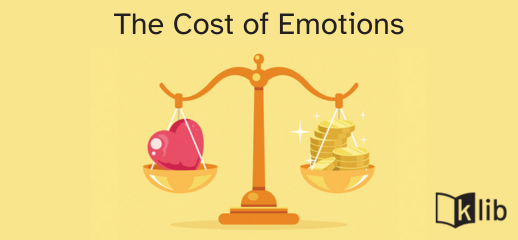Have you ever thought how costly it is to get trapped in emotions?
We invest time and mental energy in a project, job, business idea, etc., anticipating something we perceive as success (monetary, business-building, or creative satisfaction).
- Every employee would have sweated heavily to achieve his targets and goals. He does this in anticipation of success in terms of career growth
and monetary gain. - As an entrepreneur, you are piecing and marshaling available resources and taking significant risks, and for what? You want to build a profitable and successful business.
This ends on a pleasurable note when the script goes as planned!
What Happens? Life Happens! Results don’t necessarily reward in proportion to the efforts invested.
Circumstances, external environment, and business outlook will not remain the same as when you started, either enabling or crippling you.
When you don’t see success, you don’t feel good, feel miserable, or become a recluse, unwilling to talk about it or mingle and socialize. This is exactly how we bring out our emotions as we are unsure of the way forward.
The point is not about randomness in the external environment but how we deal with it.
JUST REFLECT. Because of the time and effort invested, your emotions overwhelm you and prevent you from realizing that the efforts are irrelevant, as circumstances have changed since you started.
This is where emotional intelligence helps us manage our emotions by
- Develop resistance to react.
- Pause and reflect.
- Respond appropriately.
This way, you learn to address the elephant in the room—in this case, your emotions.
Is it going to be easy to incorporate? Of course NOT.
We are emotional creatures by design. We react to situations, and building awareness is a great starting point.
Enablers in Building Awareness
In this context, it is helpful to relate to the Sunk Cost Fallacy and Opportunity Cost.
- Sunk Cost Fallacy
Sunk Cost is the investment in shaping an idea or our effort in learning a skill at work.
Sunk Cost Fallacy is your innate urge NOT to abandon your path as you feel the pinch of your past efforts, which being Sunk Cost, by definition, cannot be recovered.
You have given a great deal as an employee, but your skills might not align with new requirements, derailing your future earnings and growth. Instead of realigning to a project that matches your skills, you stick to what you are doing, feeling emotionally connected with your past efforts invested and unwilling to shift gears with a changing reality. Your efforts to learn a tool that helped you earn well in the past is a Sunk Cost. Not changing gears is Sunk Cost Fallacy.
- Opportunity Cost of Sunk Cost Fallacy
Once you control your emotions and pause, you wake up to what you are losing by continuing to do what you are doing. This is what is the opportunity cost.
Ask an entrepreneur about a decision to abandon what he is emotionally invested in. Once he realizes what alternatives he is losing, his mind opens. Every case need not necessarily mean abandoning an idea. It can be being open to new approaches and not allowing emotional baggage to hold you back.
Understanding the simple economic terms of Sunk and Opportunity cost helps us avoid succumbing to emotions and rationally decide our actions.
Thanks for reading through, do share your experiences.
Good Luck and Best Wishes.
